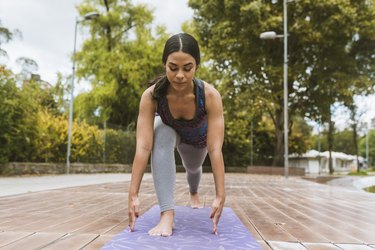
Occasionally, anger is unavoidable. And often, it can be healthy or cathartic. But without the proper outlet, those furious feelings can frequently turn toxic. To stop your anger from accruing like steam in a kettle and blowing your lid, develop safe strategies to express it.
For many, exercise is a constructive antidote to anger. While high-energy cardio workouts like kickboxing, running or rowing can help you let off some steam, heart-pounding activity isn't the only way to release rage.
Video of the Day
Video of the Day
In fact, sometimes slower, mindful movements like yoga provide the perfect avenue for venting anger.
Check out more of our 20-minute workouts here — we’ve got something for everyone.
How Yoga Helps with Anger
Yoga is a great tool for anger management, as it provides clarity to help you express your emotions more easily, says Koya Webb, yoga instructor and author of Let Your Fears Make You Fierce: How to Turn Common Obstacles into Seeds for Growth.
It does this in large part through the physical release that reduces your body's stress response and ramps up your relaxation. In particular, hip openers are helpful for the healthy expression and freeing of anger.
"A lot of repressed emotions and pent-up energy are held within our hips, so as we work to open them, we're able to literally shift energy in our bodies and open up pathways to access emotional freedom (in addition to physical, sexual and spiritual freedom)," Webb says.
But postures are only part of the equation. "Breathwork is known to help alkalize your body, which wards off the acidic nature of anger," Webb says. Deep belly breaths also activate the parasympathetic nervous system, which is the "rest and digest" mechanism that counters your body's "fight or flight" response. In other words, breathing exercises enhance your sense of calmness.
Try This 20-Minute Yoga Flow for Anger
This 20-minute yoga sequence from Webb was designed to honor your anger and create a space for it to be felt, expressed and released.
Move 1: Child’s Pose
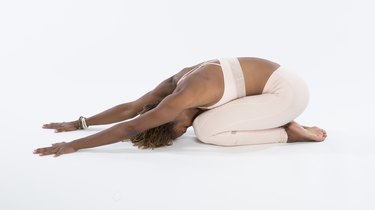
- Start on all fours. Bring your big toes together and knees slightly wider than hip-width apart.
- Extend your arms out in front of you and sit your hips back, resting your butt on your heels and bringing your sit bones toward the back of the room.
- Rest your forehead on the mat and close your eyes, feeling your upper back broaden.
- Breathe deeply in this pose for 1 minute.
Move 2: Downward Facing Dog
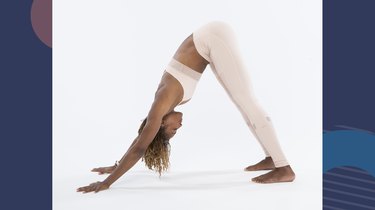
- From a tabletop position on all fours, straighten your knees with an exhale and push your hips high into the air. Your legs and back should form a triangle shape with your mat.
- If your hamstrings feel tight, bend your knees as much as needed.
- Allow your head and neck to relax into this position as you feel your spine elongate.
- Hold for 5 breaths.
Move 3: Low Lunge (Anjaneyasana)
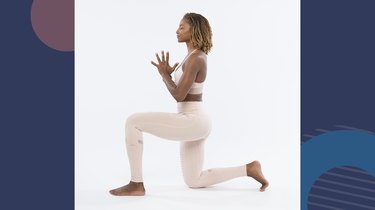
- From Downward-Facing Dog, walk your feet up toward your hands, arriving in a Forward Fold.
- Inhale to rise and step the right foot back into a Low Lunge. Feet are hip-width apart on separate tracks (they shouldn't line up front to back). Left and right toes are both pointing forward.
- Keep the spine long by lifting the heart and extending the crown of the head away from the tailbone.
- Allow the hips to shift forward and down. Notice where you feel sensation through the hip region.
- Hold for 30 seconds, then repeat on opposite side.
Move 4: Mountain Pose (Tadasana)
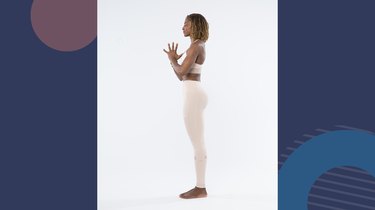
- Stand with your feet about shoulder-with apart. As you inhale, pull your navel in toward the spine and up toward the ribcage.
- Lift the heart and allow the shoulders to roll back and down. Imagine the inhalation carries fresh new energy to every part of your body. As you exhale, release energy through the base of your body into the ground below.
- Complete 3 rounds of breath, cycling energy through your body as you breathe.
Move 5: Chair Pose
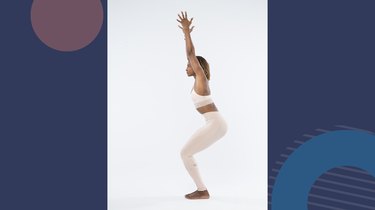
- From Mountain pose, inhale and sweep your arms above you.
- Exhaling, bend your knees as if you’re sitting into a chair, bringing your hands to heart center.
- Bring your hips lower and lift through your heart.
- Exhale as you straighten the legs, allowing your heart to move forward, your arms to come down and your fingers to brush the floor. Then draw your arms straight behind your body.
- As you breathe, try the following sequence: Inhale, embrace love. Exhale, release fear. Inhale, embrace peace. Exhale, release chaos. Inhale, embrace magic. Exhale, release doubt.
- Then, take a deep breath and come back to Chair pose.
Move 6: Warrior II (Virabhadrasana II)
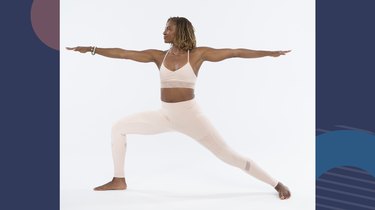
- Step your right foot back into a lunge, turning your right toes out so they point to the side of the mat, and lower your right heel to the floor.
- Keep your stance long and ensure that your left knee is bent above, or slightly behind, the left ankle.
- Bring your arms to shoulder level, stretching them out so they're parallel to the floor (the left hand should point to the front of the mat while the right points to the rear). Gaze out over your front (left hand) fingers.
- Open your hips and torso to the right side of the mat. Inhale, then lengthen through the left leg and lift your heart as you sweep your hands overhead.
- Exhale, releasing your arms back to shoulder height.
- Repeat this breathing pattern 3 times.
Move 7: Reverse Warrior (Viparita Virabhadrasana)
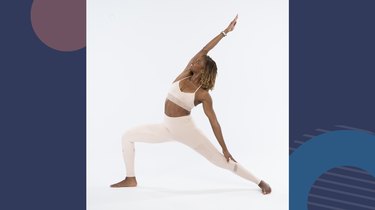
- From Warrior II, inhale, keeping your left knee bent, and slide your right fingers down your right leg as you extend the left fingers up and back toward the rear of the mat.
- Come into a slight backbend, tilt your head slightly and bring your gaze to your left hand.
- Keep your shoulders relaxed, lift your chest and lengthen through the waist.
Move 8: Extended Side Angle (Utthita Parsvakonasana)
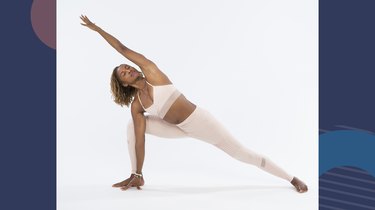
- From Reverse Warrior, exhale and lower your left arm so your forearm rests on your left thigh.
- Reach your right fingers toward the ceiling as you extend your right arm overhead. Your right biceps should be over your right ear.
- Keeping your chest, hips and legs in one straight line, turn your head to look up at the ceiling.
- Hold for 3 breaths.
Repeat Moves 4 through 8 on the opposite side before moving onto Move 9.
Move 9: Yogi Squat (Malasana)
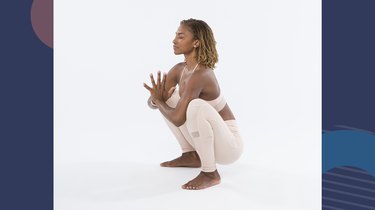
- From standing, step your feet a little bit wider than your hips and point your toes out at a 45-degree angle (this may fluctuate depending on what is comfortable for you).
- Inhale and reach your arms up above your head.
- Exhale and sit down into a Yogi Squat. You can place a block or pillow beneath your butt if needed.
- Take 5 deep breaths.
Move 10: Cow Face Pose Variation
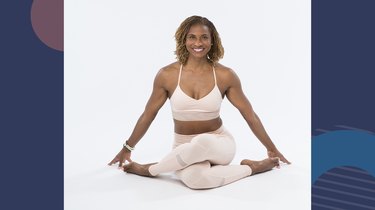
- Sit down, grounding both of your sit bones on the mat. If one is higher than the other, rest on a block or blanket to even them out.
- Cross your right knee over the left, stacking one on top of the other.
- Rest your hands on your feet. For a deeper stretch, fold forward and rest your forehead on your knee, hands or a block.
- Breath deeply for 10 breaths.
Move 11: Double Pigeon
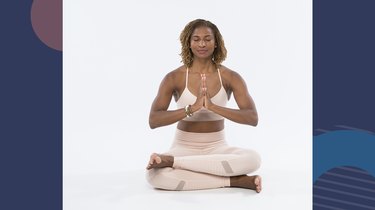
- From Cow Face pose, extend both legs straight out in front of you. Sit up tall, reaching the crown of the head up toward the ceiling, lifting the chest and lightly shrugging the shoulders back.
- Bending your right knee, rest your right leg on the mat in front of you. Your right shin should be parallel to the front of your mat. Keep your right foot flexed and perpendicular to your shin.
- Bending your left knee, stack your left leg on top of your right, so your shins are directly on top of one another and lying parallel.
- Hold for 5 breaths, then repeat on the other side with the opposite leg on top.